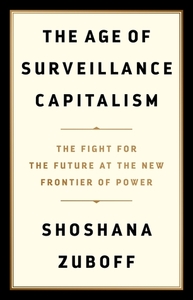Take a photo of a barcode or cover
665 reviews for:
The Age of Surveillance Capitalism: The Fight for a Human Future at the New Frontier of Power
Shoshana Zuboff
665 reviews for:
The Age of Surveillance Capitalism: The Fight for a Human Future at the New Frontier of Power
Shoshana Zuboff
hopeful
informative
reflective
fast-paced
challenging
informative
inspiring
slow-paced
challenging
informative
inspiring
reflective
slow-paced
Hmm so the entirety of anti surveillance is based on liberal philosophy. Agree with the specifics though, for most part. Very dense
There's a cliché that says if a company offers you something for free, you're the product. That's not quite true when it comes to the data driven technology firms reviewed in this book. What we are is the raw material, and the product is behavioral surplus--the corpus of data that the firms derive from our behaviors.
Shoshana Zuboff distinguishes surveillance capitalism from traditional capitalism through the use of behavioral surplus. In a traditional arrangement, money is exchanged for a product or service. While the company is interested in the behavior of its customers, that information is used to improve marketing and sell more product, and is not a product in itself. In surveillance capitalism, we trade our behavior for services, and the firm derives its profit from selling that behavioral surplus. In this arrangement, Apple is still largely traditional. Amazon is also still traditional, though it's expanding into surveillance capitalism through products such as Alexa. Google and Facebook are almost pure surveillance capitalism firms.
Surveillance capitalism operates through information asymmetry. Consumers may not be told about the information gathered, are given opaque terms of use (the average TOU should take 45 minutes to read; the average consumer takes 19 seconds--and if you don't really have a practical choice about using the product, what are you going to do?) and aren't aware of how much information can actually be extracted. For example, it's obvious that your shopping patterns can be used to form a picture of your tastes and spending habits. It's less obvious that your selfies and other pictures can be used to form a portrait of your personality.
The point, moreover, is not merely to analyze your behavior patterns, or even to use that data to make predictions. The ultimate goal is to use this data to shape future behavior, as Facebook did with its voting experiment--and then argued that it should be exempt from the laws and regulations surrounding psychological research. Pokémon Go functioned as both a collector and shaper of players' behavior, and the game was originally developed at Google.
The potentials for surveillance capitalism are worrying--applications already exist and are being developed for behavioral surplus. How will firms in other areas benefit from this, using surveillance techniques to determine creditworthiness, insurance, and health? Although in surveys people express a desire for strong privacy roles, we lack a robust regulatory framework to ensure this. The outcry over election manipulation also makes clear the potential (and reality) for large scale political disruption, which is particularly worrying given the dismissive attitudes of many tech titans towards democracy. Silicon Valley companies actively lobby against a regulatory framework that would protect consumers, instead arguing in favor of "the market" and claiming that behavioral surveillance is ultimately for the benefit of the consumer.
As a book, this is imperfect. Zuboff's language tends towards the hyperbolic, making it too easy to dismiss her as a conspiracy theorist. It's also a little long winded, rather than crisp and clear. None of this is enough to tank the book, but it keeps it from being quite as successful as it could be (were half stars allowed, I would have given this 4.5). That said, the content is worth ploughing through.
Shoshana Zuboff distinguishes surveillance capitalism from traditional capitalism through the use of behavioral surplus. In a traditional arrangement, money is exchanged for a product or service. While the company is interested in the behavior of its customers, that information is used to improve marketing and sell more product, and is not a product in itself. In surveillance capitalism, we trade our behavior for services, and the firm derives its profit from selling that behavioral surplus. In this arrangement, Apple is still largely traditional. Amazon is also still traditional, though it's expanding into surveillance capitalism through products such as Alexa. Google and Facebook are almost pure surveillance capitalism firms.
Surveillance capitalism operates through information asymmetry. Consumers may not be told about the information gathered, are given opaque terms of use (the average TOU should take 45 minutes to read; the average consumer takes 19 seconds--and if you don't really have a practical choice about using the product, what are you going to do?) and aren't aware of how much information can actually be extracted. For example, it's obvious that your shopping patterns can be used to form a picture of your tastes and spending habits. It's less obvious that your selfies and other pictures can be used to form a portrait of your personality.
The point, moreover, is not merely to analyze your behavior patterns, or even to use that data to make predictions. The ultimate goal is to use this data to shape future behavior, as Facebook did with its voting experiment--and then argued that it should be exempt from the laws and regulations surrounding psychological research. Pokémon Go functioned as both a collector and shaper of players' behavior, and the game was originally developed at Google.
The potentials for surveillance capitalism are worrying--applications already exist and are being developed for behavioral surplus. How will firms in other areas benefit from this, using surveillance techniques to determine creditworthiness, insurance, and health? Although in surveys people express a desire for strong privacy roles, we lack a robust regulatory framework to ensure this. The outcry over election manipulation also makes clear the potential (and reality) for large scale political disruption, which is particularly worrying given the dismissive attitudes of many tech titans towards democracy. Silicon Valley companies actively lobby against a regulatory framework that would protect consumers, instead arguing in favor of "the market" and claiming that behavioral surveillance is ultimately for the benefit of the consumer.
As a book, this is imperfect. Zuboff's language tends towards the hyperbolic, making it too easy to dismiss her as a conspiracy theorist. It's also a little long winded, rather than crisp and clear. None of this is enough to tank the book, but it keeps it from being quite as successful as it could be (were half stars allowed, I would have given this 4.5). That said, the content is worth ploughing through.
Very interesting topic, but very dense and seems to repeat the sames points quite a bit.
challenging
informative
sad
slow-paced
Way too long of a book to be honest. It could've been half as long and still carry the essential information it means to spread. It drags on and repeats things too much. I can see it being used as a textbook for a class on this subject but it's definitely not easily consumable by the majority of people.
challenging
informative
A powerful treatise on the behavioral and economic forces that are poised to shape our collective future unless we fight back.
challenging
informative
slow-paced





